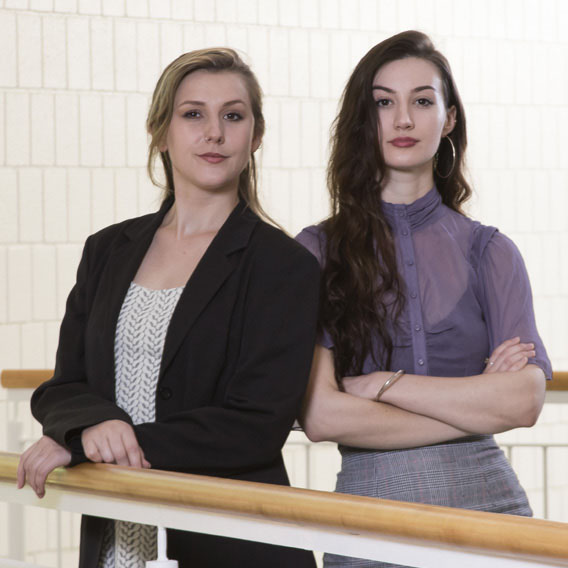Brianna Cochran is remaking her world to her own specifications.
Cochran (BSIE 18) was raised in Cleveland, a small town (pop. 3,900) in the north Georgia mountains, and realized at an early age she didn’t quite fit in. “It’s a gorgeous, gorgeous area. But everything moves slowly, and I always felt out of place,” she said.
When it came time for her to decide which university to attend and pick a major, Cochran — who is the first person in her family to attend college — wasn’t sure what she wanted to do. So she enrolled at the University of Georgia and took a few classes in computer science and upper-level math. She quickly realized that she liked this combination, and began researching fields that use these skills. That exploration led her to industrial engineering. And where better to study it than Georgia Tech’s No. 1-ranked H. Milton Stewart School of Industrial and Systems Engineering (ISyE)?
It was a no-brainer.
“When I transferred to Tech, I knew I was where I needed to be,” Cochran said. “There’s a difference in the way people think here — both the students and the teachers. Everyone is chasing really big dreams. Everyone is trying to put their best out there. So I just dove right in.”
The experience got Cochran thinking. While maintaining a solidly STEM focus, she also saw fashion and beauty as an important means of self-expression. “Everyone’s entitled to look how they want,” she insisted. “It’s very important for your confidence, for your sense of identity, for being comfortable in your own skin. It’s something I do for me."
Cochran saw her friend’s situation as a problem. And industrial engineers are problem-solvers.
At the time of McRae’s unfortunate salon experience, she and Cochran were both enrolled in a mechanical engineering special topics class on additive manufacturing. Cochran had a brainstorm: If people could use an app to design and 3D-print artificial nails to their personal specifications, then experiences like McRae’s wouldn’t happen. When Cochran learned that the U.S. nail industry is worth $8 billion annually, she became even more convinced that her idea had merit. By the end of the semester, she had persuaded McRae to join her, and together they founded VAILS (Virtual Nails).
She and McRae have designed VAILS to be water soluble, sealed with a waterproofing coating, and 100% personalized by the user using augmented reality. In addition, VAILS can be applied and removed without using the harsh, nail-damaging, and environmentally unfriendly chemicals common in salon applications of acrylic nails. They also intend for VAILS to be an inclusive product.
“We don’t like how the nail industry typically targets women,” Cochran said. “We want VAILS to be a means of self-expression for everyone.”
The duo knew that to make VAILS a successful company, they would need to combine their industrial engineering knowledge with business savvy. They enrolled in CREATE-X’s Startup Launch, Georgia Tech’s program for student entrepreneurs, and received $20,000 in seed funding along with the necessary legal advice to help budding entrepreneurs start their companies. As part of the process, they showed VAILS to a celebrity nail stylist who immediately became interested in their product.
But Cochran and McRae felt that VAILS still wasn’t quite ready to share with the world. They wanted to build on the Startup Launch experience. That was when Cochran discovered that the Fulbright Scholarship program funded a University College London’s master’s degree in entrepreneurship. The program is practical and hands on, and Cochran would be able to continue actively developing VAILS as part of her studies.
Once again, the next step seemed obvious.
McRae was the first person Cochran called when she learned she had been chosen for the prestigious award. Last September, Cochran moved to London to begin her studies. She enrolled in the program’s Technology pathway, which is for students who intend to develop high-impact services and products that take advantage of emerging technologies.
“The faculty encourage students to bring their startup ideas to class, so I won’t have to separate my work from my academic life. I’ll be able to integrate them, and this will make VAILS a stronger product,” Cochran noted.
By this coming fall, Cochran and McRae expect VAILS to be ready to showcase. “A product like this could change so many people’s lives. We are reinventing how people do their nails,” Cochran said.
She holds her future in her well-manicured hands.
Cochran provided an update on VAILS as of mid-January 2020:
VAILS has been granted free office space through Makerversity's Under 25 program, so we are now operating there -- in the heart of London. We've made finalists (out of 60-plus applicants) for a pitch competition through UCL's entrepreneurship group. Our non-provisional patent is being filed at the end of this month, and we've met some great people here in London who may be joining our team.
I'm halfway through my master's program at this point, and I've felt incredibly grateful to be a part of it. They have a great sense of community and a holistic perspective -- a natural given since the cohort comprises 70 students from 46 different countries. I have also had the opportunity to attend an entrepreneurship event at the U.S. Embassy and to meet the U.S. ambassador to UK.
For more information about VAILS, please send an email inquiry to storm@toughasvails.com.
